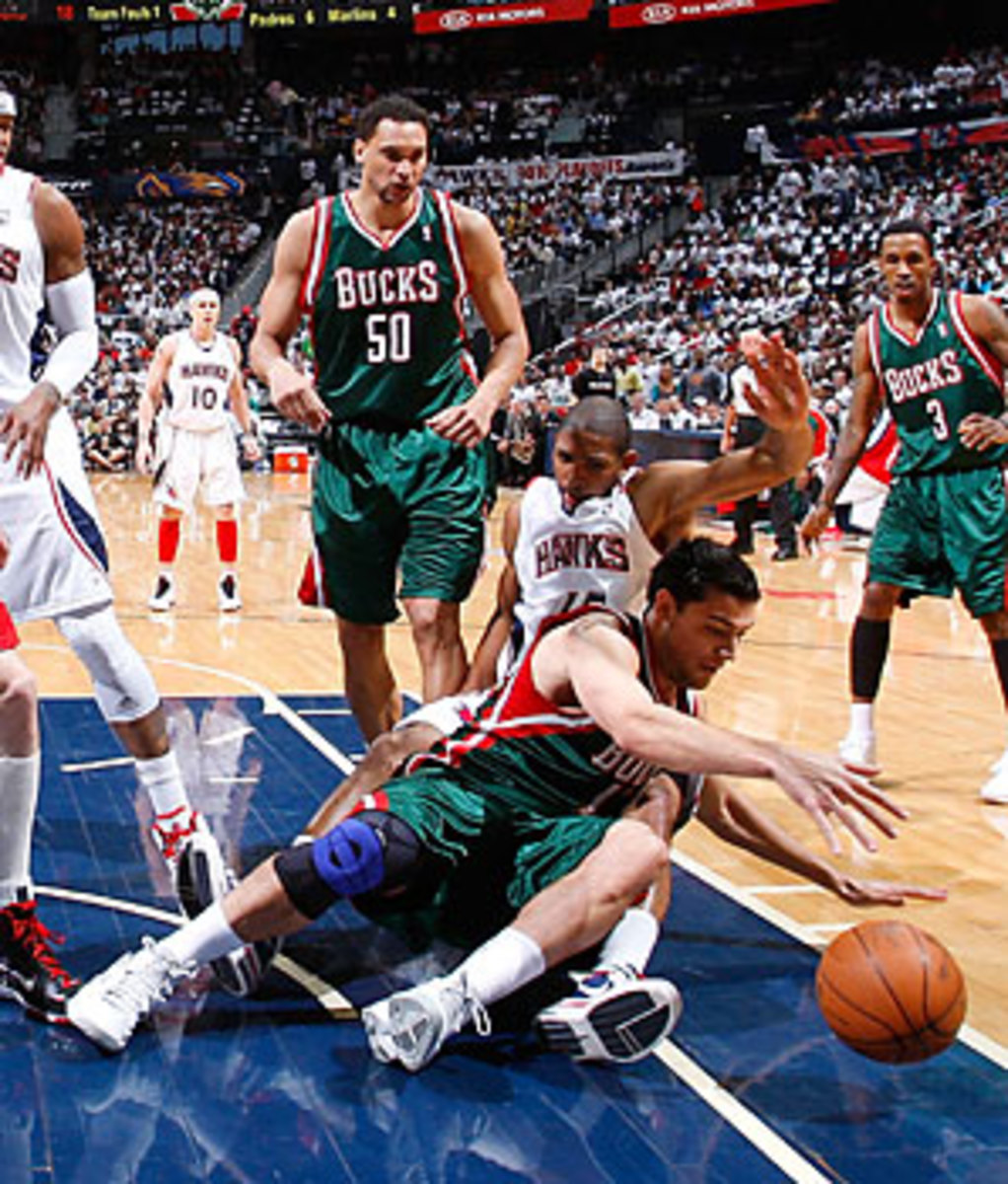
Fast Breaks: Hawks-Bucks, Game 5
• Marshmallow men. Let's not dress up the elephant in the room -- the Hawks are soft. Yes, Al Horford (25 points, 11 rebounds) played exquisitely, scoring inside and out while providing a spark for a sputtering offense. And Marvin Williams (22 points) played as the Hawks once dreamed he would when he was drafted. But come crunch time, they folded.
With a key rebound to grab that would have preserved Atlanta's one-point lead late in the fourth, it was Milwaukee reserve Ersan Ilyasova collecting the offensive board in traffic and scoring inside to give the Bucks a one-point lead. With a Jennings miss to collect, or at least ensure went out of bounds, it again was Ilyasova diving along the baseline for the ball and a pass to Carlos Delfino for a back-breaking three-pointer in front of the Hawks' bench. When a few free throws down the stretch might have salted the game away for the Hawks, it was Milwaukee driving the lane and shooting 18 free throws in the fourth quarter while Atlanta didn't step to the line once.
The Hawks have been out of sync since the series shifted to Milwaukee for Game 3. Now that they've carried their tentative play back home, they may not get a chance to return.
• Putting on the brakes. The Hawks thrive in the open floor, where their athletic skills can pile up fast break points in a hurry, get the crowd involved and feed the emotional fire this team needs. Milwaukee took those elements away for much of Game 5 with a careful plan that eschewed overworking the offensive glass to scramble back on defense and stall Atlanta's running game, which produced only 10 fast break points. Once back, the Bucks then packed in their defense toward the hoop, inducing Atlanta to shoot from midrange, which became a problem when the Joe Johnson-Mike Bibby-Jamal Crawford rotation combined to hit 11-for-39. While mucking it up on offense isn't preferable for the Hawks, that's a style with which Milwaukee is quite comfortable -- which explains why the Bucks can win despite shooting 40.5 percent.
• Where's Josh? Defenders who aren't swatting away shots at the rim require a more refined palate to appreciate, the kind that Josh Smith is developing in trying to overcome Luc Richard Mbah a Moute. The Bucks' 6-foot-8 defensive specialist made Smith little more than a bystander on offense for much of Game 5. He kept the Hawks' explosive forward in front of him defensively and largely outside of the paint, where Smith has smartly spent more time this season in lieu of his previous ill-fated romance with the three-point arc. Mbah a Moute also paid careful attention to push Smith toward the perimeter when Atlanta shot, neutralizing Smith's leaping ability on the offensive glass. Smith ended the night a quiet 3-of-8 from the floor for only seven points.
• So that's why he was the No. 2 pick. After sleepwalking through the season and disappearing quicker than a Hollywood marriage though the first four games, Williams finally had the realization that someone 6-foot-9, 240 pounds with good athleticism could have his way with the Bucks' depleted front line. Williams, chosen second overall in the 2005 draft, was consistently active Wednesday in finishing with 22 points (on 8-of-10 shooting), four rebounds and two blocks. At the start of the third quarter, Williams' eight points keyed a surge that turned a one-point Hawks lead into an 11-point cushion. If Williams could summon the energy he demonstrated in Game 5 every night, then maybe having to watch the exploits of '05 draftees Deron Williams (third pick) and Chris Paul (fourth) from afar wouldn't leave Hawks fans feeling as if someone had just scratched a chalkboard.
• There's a lot of Jerry Sloan in Scott Skiles. When Bogut's season ended less than two weeks before the playoffs, few would have blamed the Bucks for folding up their tent early in the postseason, chalking up their fate to just another devastating injury after already losing Redd earlier. But Skiles, like Sloan in Utah (after losing Andrei Kirilenko and Mehmet Okur), treated Bogut's absence as little more than a play in a game. Things happen. You take a timeout, call a play and play with what you have. That's how a team can start a frontcourt with a combined season scoring average of 20.2 points and drop a team that had won 14 in a row at home. Or how a team that averaged 36 percent from three-point range for the season can be held to 2-for-11 from the arc in front of a home crowd. And it's why Magic coach Stan Van Gundy, whose team awaits the winner of this series, might lose some sleep should Milwaukee close out the series Friday.




